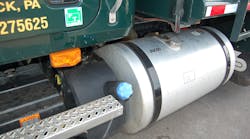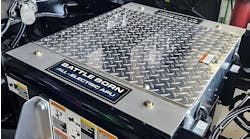Diesel and gasoline prices kept moving in opposing price directions this week, with the former increasing while the later declined, while the cost of diesel exhaust fluid (DEF) remained relatively stable.
According to data tracked by the Energy Information Administration (EIA), the average U.S. retail pump price for diesel jumped 4.7 cents this week to $3.951 per gallon, though that price is 7.2 cents per gallon cheaper compared to the same week in 2013.
EIA said diesel prices increased in all regions of the country this week except for the Rocky Mountains, where retail pump prices declined 3/10ths of a penny to $3.866 per gallon.
The agency noted the highest one-week spikes in diesel prices occurred in New England and the Central Atlantic, with both areas witnessing a 13.4-cent increase to $4.305 and $4.281 per gallon, respectively, while the East Coast as a whole watched prices increase 7.4 cents to $4.070 per gallon. California rounded out the regions where diesel eclipsed the $4 per gallon mark with a 4/10ths of a penny rise to $4.072 per gallon.
The Midwest sported the third highest uptick in retail pump prices for diesel this week with a 6.8-cent jump to $3.942 per gallon, while the Gulf Coast sported the lowest overall price for diesel in the nation at $3.775 per gallon. EIA noted.
By contrast, the U.S. average retail pump price for gasoline slipped 3/10ths of a penny this week to $3.292 per gallon, according to the agency’s numbers, which is 24.6 cents per gallon lower compared to the same week in 2013.
The Midwest and California were the only regions that witnessed a jump in gasoline prices this week, EIA said, up 1.4 cents to $3.233 per gallon and 6/10ths of a penny to $3.492 per gallon, respectively. The Gulf Coast again boasted the lowest price for gasoline in the nation at $3.083 per gallon, followed by the Rocky Mountains at $3.125 per gallon, both down 9/10ths of a penny from last week.
Where DEF is concerned, prices are remaining relatively stable, noted global consulting firm Integer Research.
According to the firm’s DEF Tracker index, the average national truck stop price for DEF remained stable at $2.79 per gallon in the U.S., where’s it been since November 2012, while in Canada, the truck stop price for DEF remained at CA 80 cents per liter or roughly $2.721 in U.S. dollars per gallon; a price DEF’s stayed at in Canada since October 2011.
By contrast, the national average price for all bulk supply modes increased in the U.S. in January, rising 7 cents for tote refills to $1.94 per gallon, while increasing 5/10ths of a penny to $1.84 per gallon for LTL deliveries and jumping up 2/10ths of a penny to $1.54 per gallon for full TL deliveries.
Detroit, MI, Atlanta, GA and Cincinnati, OH posted the lowest average prices for DEF tote refills, according to Integer, while the highest average prices for this supply mode were found in Denver, CO, Portland, OR and Salt Lake City, UT.



